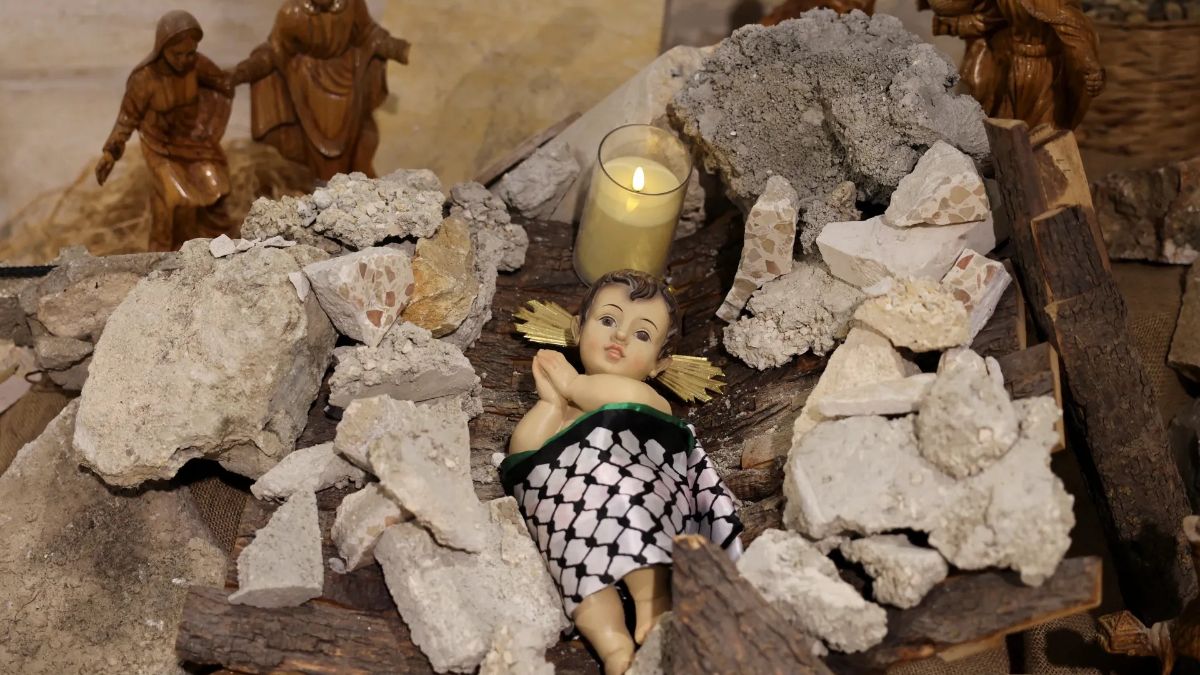Sheep or Goat?
"Truly I tell you, just as you did it to one of the least of these who are members of my family, you did it to me."
Matthew 25:31-46
November 23, 2017, Words By: Lina Thompson, Image By: "Judgement of the Nations" Sant’Apollinare Nuovo
This is the final week of the liturgical year. It’s Christ The King Sunday in which we celebrate the reign of Christ dawning in this age and in the age to come. But, as we’ve seen throughout the Gospel of Matthew, it is an unusual, upside down kingdom that redefines power and relocates God at the bottom, not at the top. God comes to us in what Mother Theresa called “the distressing disguise of the other,” in the face of the despised and rejected. That, in a nutshell, is the Gospel. It’s Word made flesh!
This week Jesus tells the familiar parable of the sheep and the goats. It is the quintessential passage for justice workers. You can hear us licking our chops. At first glance, it looks like a straightforward parable about the judgment of individuals who refuse to care for the most vulnerable.
When the Son of Man comes in his glory, and all the angels with him, then he will sit on the throne of his glory…and he will separate people, one from another, as a shepherd separates the sheep from the goats.
Brian Zahnd, in his book, A Farewell to Mars, points out that the misleading use of the word “people” in verse 32 makes us think this passage is primarily about the judgment of individuals. But a more careful reading of the text suggests that this parable has more to do with the very earthly judgment of “nations” who refuse to protect their most vulnerable members; they are ultimately consumed by their own violence in the process. Zahnd supplies a more accurate translation, replacing “people” with “nations,” and draws this conclusion.
“So how does Jesus judge or evaluate nations? What criteria does he use? When we evaluate nations, we tend to do so on the basis of wealth and power—Gross Domestic Product, standard of living, strength of the economy, strength of the military. But this is not the criterion Jesus uses to judge the nations as he sits upon his glorious throne. Jesus judges nations on how well they care for four kinds of people:
The Poor: “I was hungry and you gave me food, I was thirsty and you gave me something to drink . . . I was naked and you gave me clothing.”
The Sick: “I was sick and you took care of me.”
The Immigrant: “I was a stranger and you welcomed me.”
The Prisoner: “I was in prison and you visited me.”
I am ashamed to admit how often I have used this passage as a self-righteous soapbox to guilt individuals into serving the poor. But this parable is not primarily about our individual behavior towards the marginalized, as important as that is. It’s first and foremost about what happens to nations who refuse to build and sustain just systems for their most vulnerable members.
And what happens if we don’t?
“Then he (Jesus) will answer them, ‘Truly I tell you, just as you did not do it to one of the least of these, you did not do it to me.’ And these will go away into eternal punishment, but the righteous into eternal life.”
Again, the English translation makes it seem like this is not only about judgment, but the eternal punishment of individuals. Paul Nuechterlein convincingly suggests the phrase “eternal punishment” is better translated “as a time of punishment.” The phrase, “The righteous” is better translated as “just nations,” and “eternal life” is better translated as “life in God’s new age.” In other words, nations who refuse to care for the vulnerable…
…will go away into a time of punishment, but the just nations into life in God’s new age.
Jesus is speaking about the concrete consequences of our collective violence against the despised and rejected. Systematic injustice always ends in an outbreak of violence on a massive scale that has nation against nation. The “time of punishment,” then, is referring to this outbreak of violence that consumes us. This is not God’s eternal judgment on individuals. It is our earthly judgment upon ourselves, and its consequences are very real for all of us, especially for the most vulnerable.
It’s a tough place to end the liturgical year, with the threat of uncontrollable violence. But, that is exactly what’s at stake unless we repent and enter life in God’s new age by standing with the demonized until the demonizing stops, absorbing the violence that threatens to consume us. Come Lord Jesus…
See Paul Nuechterlein’s commentary, which has informed this reflection.



